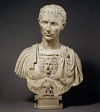|
Julius Caesar- Opposition to the Optimates
|
 Caesar was best known as a man of pleasure, celebrated for both his debts and his intrigues. In politics he had no force behind him but that of the discredited party of the populares, reduced to lending a passive support to Pompey and Crassus. As soon as the proved incompetence of the senatorial government had brought about the mission of Pompey to the East with the almost unlimited powers conferred on him by the Gabinian and Manilian laws of 67 and 66 B.C., however, Caesar plunged himself into a network of political intrigues which it is no longer possible to unravel.
Caesar was best known as a man of pleasure, celebrated for both his debts and his intrigues. In politics he had no force behind him but that of the discredited party of the populares, reduced to lending a passive support to Pompey and Crassus. As soon as the proved incompetence of the senatorial government had brought about the mission of Pompey to the East with the almost unlimited powers conferred on him by the Gabinian and Manilian laws of 67 and 66 B.C., however, Caesar plunged himself into a network of political intrigues which it is no longer possible to unravel.
In his public acts he lost no opportunity of upholding the democratic tradition.
As early as 68 B.C. he had paraded the bust of Marius at his aunt's funeral. Again, in 65 B.C., while curule aedile, he restored the trophies of Marius to their place on the Capitol. Then, in 64 B.C., as president of the murder commission, he brought three of Sulla's executioners to trial, and in 63 B.C. he caused the ancient procedure of trial by popular assembly to be revived against the murderer of Saturninus.
By these means, together with the lavishness of his personal expenditures on public entertainments as aedile, he acquired such a great popularity with the plebs that he was elected pontifex maximus in 63 B.C. against such well-known rivals as Q. Lutatius Catulus and P. Servilius Isauricus.
However, all this was on the surface. There can be no doubt that Caesar was perfectly aware of at least some of the threads of conspiracy which were woven during Pompey's absence in the East.
According to one story, the enfants perdus of the revolutionary party...Catiline, Autronius and others...designed to assassinate the consuls on the 1st of January 65, and make Crassus dictator, with Caesar as master of the horse. We also learn that a public proposal was made to confer upon him an extraordinary military command in Egypt, not without a legitimate king and nominally under the protection of Rome. An equally abortive attempt to create a counterbalance to Pompey's power was made by the tribune Rullus at the end of 64 B.C. He proposed to create a land commission with very wide powers, which would in effect have been wielded by Caesar and Crassus. This bill was defeated by Cicero, consul in 63 B.C.
In the same year the conspiracy associated with the name of Catiline came to a head. The charge of complicity in this conspiracy was levelled at Caesar, and, indeed, was hinted at by Cato in the great debate in the senate.
Caesar, for party reasons, found himself bound to oppose the execution of the conspirators. While Crassus, who shared in the accusation, was the richest man in Rome and the least likely to further anarchist plots. Both, however, doubtless knew as much and as little as suited their convenience of the doings of the left wing of their party, which served to aggravate the embarrassments of the government.
As praetor in 62 B.C., Caesar supported proposals in Pompey's favour which brought him into violent collision with the senate. This was a master-stroke of tactics, as Pompey's return was imminent. Thus when Pompey landed in Italy and disbanded his army he found in Caesar a natural ally. After some delay, said to have been caused by the exigencies of his creditors, which were met by a loan of £200,000 from Crassus, Caesar left Rome for his province of Further Spain, where he was able to retrieve his financial position, and to lay the foundations of a military reputation. He returned to Rome in 60 B.C. to find that the senate had sacrificed the support of the capitalists (which Cicero had worked so hard to secure), and had finally alienated Pompey by refusing to ratify his acts and grant lands to his soldiers. Caesar at once approached both Pompey and Crassus, who alike detested the existing system of government but were personally at variance, and succeeded in persuading them to forget their quarrel and join him in a coalition which should put an end to the rule of the oligarchy. He even made a generous, though unsuccessful, endeavour to enlist the support of Cicero. The so-called First Triumvirate was formed, and constitutional government ceased to exist save in name.
The Coalition with Pompey and Crassus
Julius Caesar
Rome
the Eternal City
Sitemap
Travel
|

